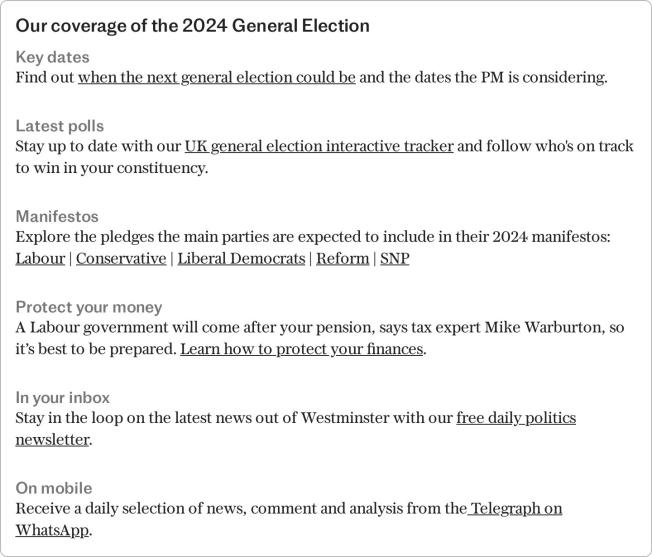Labour vows to disregard Nimbys and build more prisons

Labour will overrule local opposition from Nimbys to build more prisons to tackle the overcrowding crisis, the shadow justice secretary has said.
Shabana Mahmood told The Telegraph crammed prisons were a “powder keg” that could “explode” into riots, with new jails necessary for public protection.
On Saturday, Labour will announce that it would deliver 14,000 additional prison places by 2030 if it wins the election.
Ms Mahmood has warned prospective Labour MPs that “not in my back yard-style concerns” about new prisons in their constituencies would be rebuffed.
The party plans to designate all prison projects as nationally important – meaning planning decisions are made by ministers, not councils, when projects are frequently held up by local opposition.
Labour is also promising “employment councils” to link governors and local employers and cut reoffending rates by getting former inmates into work.
England and Wales have a prison population of about 88,000, routinely running at about 98 or 99 per cent of prison capacity. Overcrowding has forced ministers to take the unprecedented measure of releasing certain types of offenders up to 70 days early, while police chiefs have been told to make fewer arrests.
The Conservatives had pledged to create 20,000 extra places by the mid-2020s, but had to abandon the target date with only 6,000 of the places delivered.
Labour will pledge to deliver the outstanding 14,000 places by taking control of the planning process, and will also promise to tackle nuisance quad bikers as part of a planned crackdown on antisocial behaviour.
Speaking exclusively to The Telegraph, Ms Mahmood said: “From day one, an incoming Labour government is going to designate all prison projects as being of national importance.”
She said the move would end a situation – which had lasted for decades – “where the planning process essentially gets in the way and prevents prison capacity from being delivered in this country”.
Ms Mahmood said Labour was targeting delivery of the places by the end of the next Parliament, and that funding was no object because the Government had already allocated the necessary capital expenditure.
“The real tragedy in relation to the capacity crisis is it’s actually no longer a money problem,” she added. “The money is sitting there. It’s just completely shocking that they’ve failed to spend it.”
She claimed that the Tories had allowed “planning complaints from their back benches” to get in the way of delivering extra capacity.
Setting out Labour’s approach, she said: “Fundamentally, once a site is suitable, a prison is going to be built there. I have a prison [HMP Birmingham] in my own constituency, so while I’m sympathetic to local concerns... I know that these are necessary public assets necessary for public protection.
“We will not allow delay and dither and ridiculous complaints to get in our way.”
Ms Mahmood said she was willing to consider a “good suggestion” by Lord Blunkett, the former home secretary, for the creation of a network of mini-prisons, but wanted to “look at the costings”.
“Some of the temporary measures that are taken actually end up being much more expensive in the long run,” she added. “I will consider whatever mix of types of prison places are necessary to get to that 20,000 as quickly as possible. I’m almost certain we will need to identify new sites.”
On Saturday night, The Observer reported that Labour would also establish 80 new specialist rape courts across England and Wales to speed up cases.
‘I believe in giving someone a chance’
Shabana Mahmood meets The Telegraph in a location that has a special place in Labour Party mythology.
With Parliament dissolved, the usual stomping ground of the shadow justice secretary is out of bounds, and Labour’s new HQ in Southwark is deemed too hectic.
Instead, an aide arranges a room at Westminster’s Millbank Tower, which just happens to be the building where Tony Blair ran his 1997 general election campaign.
With Labour still 20 points ahead in the polls, is she finally daring to dream that the party can replicate his victory after 14 years of opposition?
Ms Mahmood – who was Labour’s national campaign coordinator before being promoted to the justice brief last year – shows New Labour-era levels of message discipline.
“Having run the campaign for two years, I was very much one of the absolute militants when it came to no complacency,” she says. “Nothing has changed.”
She bats away polls suggesting Labour is on track for a majority, which could even eclipse the 1997 result.
“The message in the HQ team at the campaign and for everyone else is to look straight past those polls, because not a single vote has yet been cast,” she says.
“The minute you take your eye off that ball, I think that’s when campaigns go wrong.”
Ms Mahmood is talking to The Telegraph to unveil Labour’s plan to address the crisis in prison capacity.
The overcrowding in Britain’s jails is deemed so serious that it is reportedly on a risk register held by Sue Gray, Labour’s chief of staff, of issues that could explode in the early days of a new government. It has apparently been dubbed “Sue’s s--- list.”
Ms Mahmood is coy about whether she has seen such a register. “I’m not going to get in the way of Sue Gray and any internal list that she has,” she says.
But she says she has discussed the crisis with Ms Gray and Sir Keir Starmer, and that they expect it to be “right at the top” of the in-tray of problems requiring urgent attention if Labour get in.
To address the situation, Ms Mahmood is promising to face down local opposition to build more prisons.
She also believes that cutting reoffending can help take strain off the system, with Labour planning new ‘employment councils’, which will “bring together charities, third sector organisations and prison governors” to “make sure that the training and the skills that are on offer in our prisons match the local jobs market”.
Ms Mahmood, who has previously employed an ex-offender herself, says that Britain is a country where people “believe in giving someone a chance”.
She believes that the nation will be less forgiving of Rishi Sunak’s decision to leave D-Day commemorations early. Ms Mahmood says she was “astonished” by the Prime Minister’s decision. “I just thought, ‘What is wrong with the guy?’ frankly.”
‘Loss of trust’
Ms Mahmood has known Mr Sunak for a long time. They attended Lincoln College Oxford together, where she reputedly persuaded the future prime minister to vote for her as the junior common room president.
Asked whether his performance in the campaign is in line with the student she knew, she says: “Nothing that I saw of Rishi when we were at university necessarily predicted his future career as a Tory politician.”
A barrister by trade, Ms Mahmood became the UK’s first female Muslim MP when she was elected in 2010.
She has previously said that Labour suffered a “loss of trust” with British Muslims over some of its early statements on the Gaza conflict but insists it is working “hard to earn trust back”.
People can see that the party’s stance has “shifted”, she says. “We’ve been calling for an immediate ceasefire, the release of all hostages, and getting aid into Gaza, but also for that pathway to peace for a two state solution.”
While her constituency of Birmingham Ladywood is on paper one of the safest Labour seats in the country, she is facing a challenge from Akhmed Yakoob, a George Galloway-aligned candidate running against Labour’s policy on the Middle East.
Ms Mahmood stands by her “long track record of speaking on behalf of the Palestinian people”. At a ‘Clause V’ meeting on Friday, Labour signed off a manifesto that includes a commitment to recognise the state of Palestine before the conclusion of a peace process.
“We believe that statehood is the inalienable right of the Palestinian people,” she says. “Self determination, you know, that’s not in the gift of any neighbour. No one gets a veto over whether the Palestinian people have their own state.”
Ms Mahmood is sworn to secrecy about the manifesto, but she says the Clause V meeting went well.
Having attended the meetings for the 2017 and 2019 manifestos – when Labour agreed long lists of expensive policies – she observes that this one was “shorter”.
“A plus point, frankly,” she says with a laugh.
Ms Mahmood says the meeting was optimistic but marked with “real realism” – not an epithet that you would imagine being used during the Corbyn years.
With Labour fighting a safety-first campaign with a stripped down manifesto, commentators have revived the metaphor Roy Jenkins used in 1997 of the party “carrying a priceless Ming vase across a highly polished floor”.
But Ms Mahmood rejects claims that Labour is running an uninspiring campaign. “I don’t think there’s anything inspiring about making promises you know you can’t keep. That’s actually deceiving yourself and the public.
“We’re not going to play fast and loose with the nation’s money.”
With less than four weeks to go, has Labour progressed that fragile vase a bit further towards its destination?
“I’ll simply say we’re fighting for every vote,” she says with another laugh. “It’s, in the end, the British public that makes these decisions, vase or no vase.”



